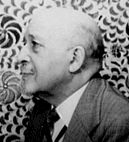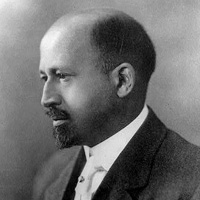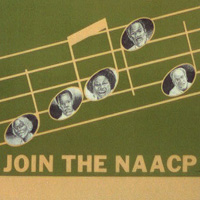of the
The city of
Harlem was blossoming into the capital of the Black community
during the 1920s because of men and women like W.E.B. Du
Bois. A spirit of racial pride was flowing throughout the
black community, where musicians, artists, and writers were
able to express themselves without interruption. There were
Nightclubs showing many great Jazz musicians known around the
nation like Duke Ellington, Jelly Roll Morton, and Fletcher
Henderson where African Americans could express themselves.
Not only was it a renaissance of the arts it was a 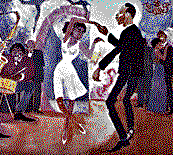 renaissance in the way in which Whites
perceived their fellow Blacks. Even more than a revolt
against prejudice, the Harlem Renaissance encouraged pride in
the special culture of Black Americans. This was a
significant step for African-Americans, for the first time
since their emancipation they were taking a significant step
forward to equal rights. Whites living in New York recognized
the vibrancy that was going on in the black community and
traveled to Harlem to experience their culture. They proved
to their white countrymen that their race was worthy of
respect, although blacks were still segregated from whites
this was by all means a step in the right direction. The
Harlem Renaissance helped advance the African American cause
of equality through their music, art, and literature
renaissance in the way in which Whites
perceived their fellow Blacks. Even more than a revolt
against prejudice, the Harlem Renaissance encouraged pride in
the special culture of Black Americans. This was a
significant step for African-Americans, for the first time
since their emancipation they were taking a significant step
forward to equal rights. Whites living in New York recognized
the vibrancy that was going on in the black community and
traveled to Harlem to experience their culture. They proved
to their white countrymen that their race was worthy of
respect, although blacks were still segregated from whites
this was by all means a step in the right direction. The
Harlem Renaissance helped advance the African American cause
of equality through their music, art, and literature
The Crisis, established and edited
by W.E.B. Du Bois, became an important periodical for African
Americans. The NAACP and Du Bois were able to circulate
80,000 of these monthly periodical within a decade of its
first publication. The Crisis  brought up issues like lynching and
racial prejudice, which the periodical fiercely denounced. The
Crisis also served as a way for Du Bois to spread his
opinion and objectives to the African American people. It was
read by many African American families and played an
essential role in the creation of African American public
opinion. Households ranging from poor rural Blacks to middle
class Blacks to Whites sympathetic to the Black renaissance
could and would read The Crisis. Du Bois could change
the opinion of thousands of Americans, black and white, to
his side of a opinion through the periodical The Crisis.
brought up issues like lynching and
racial prejudice, which the periodical fiercely denounced. The
Crisis also served as a way for Du Bois to spread his
opinion and objectives to the African American people. It was
read by many African American families and played an
essential role in the creation of African American public
opinion. Households ranging from poor rural Blacks to middle
class Blacks to Whites sympathetic to the Black renaissance
could and would read The Crisis. Du Bois could change
the opinion of thousands of Americans, black and white, to
his side of a opinion through the periodical The Crisis.
Arrival of a New Black Culture
The Harlem Renaissance bore a new type of literature through
the African Americans perspective. New York City during the
1920s and 1930, was able to read the first nationally
respected literature by Black writers it highlighted their
ability to establish their own culture. Beliefs founded upon
the works of W.E. B. Du Bois, editor of The Crisis,
aided the African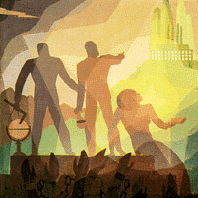 American
literature. Du Bois believed that black Americans could not
attain equality in the eyes of the whites by emulating them.
They must have pride in their own race and establish their
own culture. Du Bois also believed educated Blacks should
lead the rest of their race to equality. Although very
different they had a common bond, they were Black, and their
literature expressed their common bond. Some influential
writers in the Harlem Renaissance were Claude McKay, James
Weldon, and Jean Toomer. For the first time in the history of
the United States did literary critics take African American
writing seriously.
American
literature. Du Bois believed that black Americans could not
attain equality in the eyes of the whites by emulating them.
They must have pride in their own race and establish their
own culture. Du Bois also believed educated Blacks should
lead the rest of their race to equality. Although very
different they had a common bond, they were Black, and their
literature expressed their common bond. Some influential
writers in the Harlem Renaissance were Claude McKay, James
Weldon, and Jean Toomer. For the first time in the history of
the United States did literary critics take African American
writing seriously.

